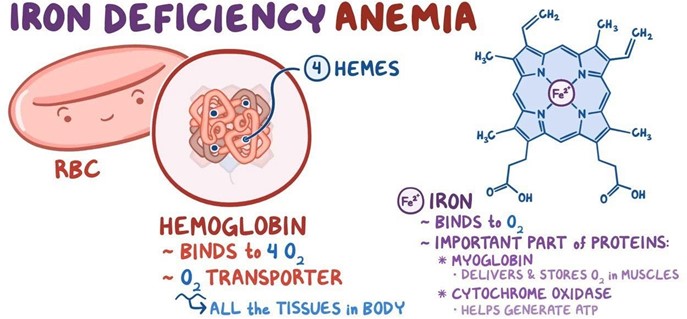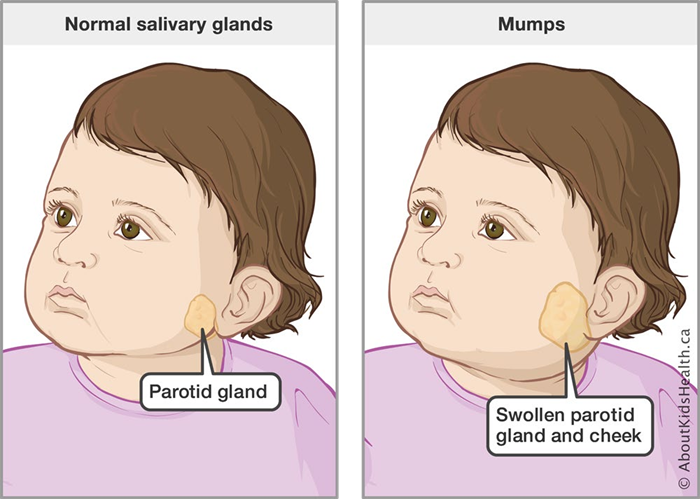A nurse in a pediatric clinic is caring for a child who has iron deficiency anemia and a new prescription for ferrous sulfate tablets. Which of the following instructions should the nurse provide the parents regarding the administration of this medication?
Iron (Ferrous Sulfate) may turn stools tarry green.
Administer at bedtime.
Give with a 240 mL (8 oz) glass of milk.
Administer at mealtimes.
The Correct Answer is A
Choice A: This instruction is correct, as iron supplements can cause a change in the color and consistency of stools, making them dark, green, or black. This is not a sign of bleeding or infection, but a normal side effect of iron therapy. The parents should be informed of this possibility and reassured that it is harmless.
Choice B: This instruction is incorrect, as iron supplements should not be administered at bedtime, but rather one hour before or two hours after meals. This is because iron absorption is reduced by food, especially dairy products, antacids, or calcium supplements. The parents should be instructed to give the medication on an empty stomach or with a small amount of food if it causes nausea.
Choice C: This instruction is incorrect, as iron supplements should not be given with milk, as milk contains calcium, which can interfere with iron absorption and reduce its effectiveness. The parents should be instructed to avoid giving milk or other dairy products within two hours of the medication.
Choice D: This instruction is incorrect, as iron supplements should not be administered at mealtimes, but rather one hour before or two hours after meals. This is because iron absorption is reduced by food, especially dairy products, antacids, or calcium supplements. The parents should be instructed to give the medication on an empty stomach or with a small amount of food if it causes nausea.

Nursing Test Bank
Naxlex Comprehensive Predictor Exams
Related Questions
Correct Answer is D
Explanation
Choice A reason: This choice is incorrect because the BCG vaccine is not recommended for adolescents in the United States. The BCG vaccine is a vaccine that protects against tuberculosis (TB), a bacterial infection that affects the lungs and other organs. It may be used for children who live in countries where TB is common or who have a high risk of exposure to TB, but it is not routinely given in the United States because of the low incidence of TB and the possibility of false-positive results on TB skin tests.
Choice B reason: This choice is incorrect because the pneumococcal polysaccharide vaccine is not recommended for adolescents unless they have certain medical conditions. The pneumococcal polysaccharide vaccine is a vaccine that protects against pneumococcal disease, a bacterial infection that can cause pneumonia, meningitis, or sepsis. It may be used for adults who are 65 years or older or who have chronic diseases, immunosuppression, or cochlear implants, but it is not routinely given to adolescents who are healthy.
Choice C reason: This choice is incorrect because the influenza vaccine is recommended for adolescents every year, not just before college. The influenza vaccine is a vaccine that protects against influenza, a viral infection that affects the respiratory system. It may be given as an injection or a nasal spray, and it may prevent or reduce the severity of influenza and its complications. It is recommended for everyone who is 6 months or older, especially those who have a high risk of influenza-related complications.
Choice D reason: This choice is correct because the meningococcal polysaccharide vaccine is recommended for adolescents before college. The meningococcal polysaccharide vaccine is a vaccine that protects against meningococcal disease, a bacterial infection that can cause meningitis, septicemia, or death. It may be given as a single dose or a booster dose, and it may prevent outbreaks of meningococcal disease in crowded settings such as dormitories or military barracks. It is recommended for adolescents who are 11 to 12 years old, with a booster dose at 16 years old, or for those who are entering college and have not been previously vaccinated.
Correct Answer is D
Explanation
Choice A: Contact precautions are not necessary for a child who has mumps, as mumps is not transmitted by direct or indirect contact with the infected person or their environment. Contact precautions are used for infections that are spread by contact with skin, wounds, body fluids, or contaminated surfaces.
Choice B: Standard precautions are always used for any patient care, regardless of their diagnosis or infection status. Standard precautions include hand hygiene, use of personal protective equipment (PPE), safe injection practices, and proper disposal of waste and sharps. However, standard precautions alone are not sufficient for a child who has mumps, as mumps are transmitted by respiratory droplets.
Choice C: Airborne precautions are not necessary for a child who has mumps, as mumps are not transmitted by small particles that remain suspended in the air and can be inhaled by others. Airborne precautions are used for infections that are spread by airborne transmission, such as tuberculosis, measles, or chickenpox.
Choice D: Droplet precautions are required for a child who has mumps, as mumps are transmitted by large respiratory droplets that are expelled when the infected person coughs, sneezes, or talks. Droplet precautions include wearing a surgical mask when within 3 feet of the patient, placing the patient in a private room or cohorts with other patients with the same infection, and limiting visitors and staff who are susceptible to the infection.

Whether you are a student looking to ace your exams or a practicing nurse seeking to enhance your expertise , our nursing education contents will empower you with the confidence and competence to make a difference in the lives of patients and become a respected leader in the healthcare field.
Visit Naxlex, invest in your future and unlock endless possibilities with our unparalleled nursing education contents today
Report Wrong Answer on the Current Question
Do you disagree with the answer? If yes, what is your expected answer? Explain.
Kindly be descriptive with the issue you are facing.
